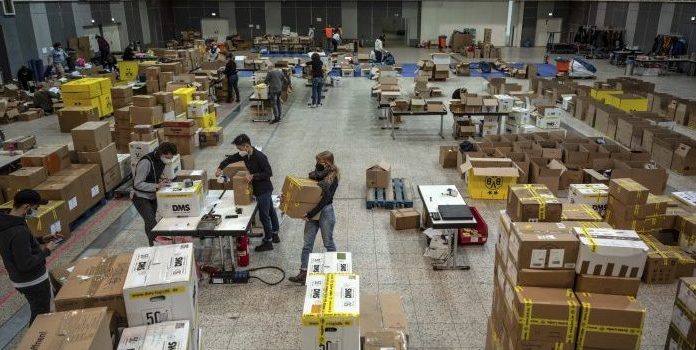(John Ransom, Headline USA) The president of the World Bank, David Malpass, has warned that the war in Ukraine–and the sanctions imposed on Russia–will result in a “huge shock” to global food supply in addition to the shock already apparent in oil, according to a Malpass interview on Fox News.
“The U.S. has put in strong sanctions, Europe has put in strong sanctions, and it affects world oil trade and also… food trade, which is so important — both Russia and Ukraine were big providers of food,” Malpass said, according to Fox Business.
Russia’s attack on Ukraine has already caused a sharp rise in world wheat prices. According to economists, there will be big problems with supplies and rising food prices. 🇷🇺 is not only killing Ukrainians but also pushing the world into a food crisis. #StopRussia pic.twitter.com/6y0Tv10tY6
— Stratcom Centre UA (@StratcomCentre) March 4, 2022
“Now as banks stop working with Russia, then it changes the trade lines going on. China may be able to make up for some of that… they buy some of the oil, some of the wheat from Russia, but… for the total world, it’s a huge supply shock that’s going on,” Malpass added.
Meanwhile food prices have skyrocketed 20 percent over the last year, not accounting for the effects that the Russian war will have on food prices, which are at record highs already the UN said, according to Reuters.
The effect economically could be far greater than when the US real estate market busted in 2008 and 2009– with mass starvation thrown into the bargain this time around.
So if you thought that under President Joe Biden things would get better or even get back to normal, another thought might be in order.
To make matters worse, the federal government is endangering domestic food security by dragging its feet on the continued aggressive purchases of US farmland by communist China.
Underscoring the trouble, the UN’s Food and Agriculture Organization (FAO) said that conditions in agriculture are dissuading farmers worldwide from planting more because their profits are eaten up by inflation.
“A much bigger push for food price inflation comes from outside food production, particularly the energy, fertilizer and feed sectors,” FAO economist Upali Galketi Aratchilage told Reuters. “All these factors tend to squeeze profit margins of food producers, discouraging them from investing and expanding production.”
The result, said the Associated Press, is that food supplies in Baghdad, Cairo, Indonesia, Nigeria and South Africa, for example, will be under pressure in everything from corn to hogs.
“Wheat, corn, oils, barley, flour are extremely important to food security … especially in the poorer parts of the globe,” Anna Nagurney, a professor of supply chains, logistics and economics at the University of Massachusetts Amherst told the Associated Press.
And the worst part is that food prices, already bad enough, won’t get really bad until July– just in time to celebrate the Fourth of July and the one-year anniversary of Biden declaring US independence from Covid.
“Mission accomplished,” so to speak.

